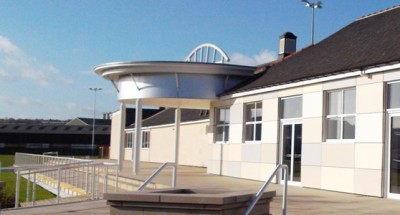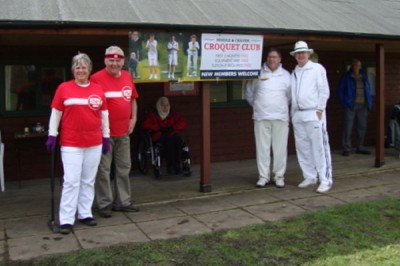
Was it the Ides of March or the Rite of Spring which brought four players to the lawns at Pendle on the first day of spring? Neither, it was Sport Relief! As part of Pendle and Craven Croquet Club’s recruitment and retention plan, the club decided to engage in a twenty-four hour croquet marathon. Our main purpose, unashamedly, was to promote the club and raise the club’s profile in our catchment area. We reasoned that we just couldn’t arrange a match and expect publicity, but that Sport Relief would give us the platform we wanted and more importantly, it was for a really good cause. Our angle with the press was twofold. First, it was for Sport Relief but from a unique sport, namely croquet and secondly and more interesting for the press, as it turned out, it was four `oldies’ who were undertaking this challenge. We succeeded in getting a half page article with photograph in the Lancashire Evening Telegraph, The Craven Herald, The Barnoldswick Times and The Nelson Leader. As I write this article for the Gazette, the follow up article on the amount we raised, who won, etc., with appropriate photographs, has been emailed to our friends in the press, and we are hoping for similar sized articles in each of the aforementioned publications.
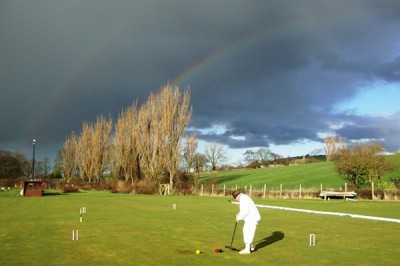
I know that you can’t wait to hear about the match so on with the report. The game was association croquet, not handicap and not advanced! In order to make it last 24 hours we increased the hoop points by 48 times to 1152 plus 2 peg points, i.e. 1154 up. We could have been playing yet, so we time limited the game to 24 hours. When time was called, Liz Wilson (2.5) Chairman of The North West Federation and Roger Schofield (2) Chairman of Pendle and Craven were leading 260 to Garry Wilson(12) and Paul Rigge(-1) Secretary of the North West Federation with their score of 204. This sounds quite a convincing win for Liz and Roger but they were more than 120 points in front when day light broke, so Garry and Paul were making quite a comeback and things might have been very different with a longer time limit.
Liz and Roger won the toss and elected to play with black and blue. Garry and Paul chose to go second. Kathleen Beech, widow of founding secretary John Beech, sounded the bell for play to commence at noon on Friday. It looked like the game would get of to a good start as Garry hit in on the fourth turn and made a good leave. Sadly for Garry, Roger hit and started a break. On the seventh turn Liz also started a break and went to rover on the first round but after this the scoring slowed down. It was 1:15pm before the Paul/Garry team ran its first hoop. A good excuse from Garry was that the court had been laid out specifically for the benefit of spectators sitting in front of the club house, and nothing was in its normal place and certainly not at right angles to the fences or even the cut of the grass! However, we all agreed that the winter work had paid major dividends and that the grass at Pendle was and is in superb condition in readiness for this year’s tournaments.
Darkness fell around 7pm and the halogen floodlights came on. We had arranged to hire the lights from the Skipton branch of SHC Ltd, an equipment and plant hire company, but they would have none of it and allowed us free use of the equipment – thanks, Johnny! Once the layers of clothing had doubled, even tripled, the drop in temperature became a strange incentive for play to speed up and our scoring rate increased. We are all convinced that Liz never missed a hit in, or a rush for the first nine hours. The fact that we could no longer see beyond the edges of the court may have helped our productivity or it may have been because Roger’s wife Kathryn arrived with the evening meal.
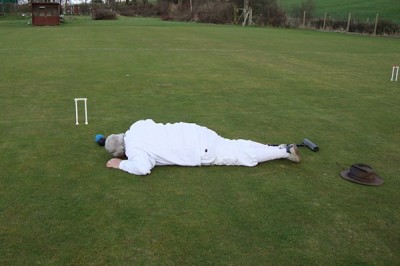
By 11:30pm our steady flow of visitors totally dried up. As the night rolled into the early hours our weather log showed a drop in temperature to 2 degrees and sometimes below, with rain like a spring shower alternating with rain like stair rods. It was the hail which arrived when Garry was playing that turned the court white, only to be gone five minutes later. It was around this time that Garry was heard to mutter, “If I have any more bright ideas, just remind me of tonight”. So the Gods of croquet were testing our stamina and as dawn broke they relented and a beautiful still, bright morning unfurled as the sun rose and the moon was still in the sky. It’s amazing how much a roquet echoes at half past five in the morning.
Throughout the night the play was mixed. Liz made the biggest break of 19 hoops. Paul made the next sizeable brake of 15 hoops peeling partner ball through the next 3 hoops unfortunately in the wrong direction. We put it down to disorientation, fatigue and sheer bloody mindedness. Roger then made a 17 hoop break but Paul countered with a 17 hoop break plus 2 peels on partner ball and a 21 point break with 3 peels on Garry’s ball, in the right direction this time. Paul’s break was never bettered in the match.
At 7:15am Garry’s wife Audrey arrived with the bacon sandwiches. She was our first visitor on Saturday, and we started to attract a large number of spectators from around 10:30. Our latest member (social member), Ken Tennant called time at 12 noon. By this time mental fatigue now partnered the physical tiredness as Liz asked what to do with her last stroke. Roger told her to, “Stick it in a corner”, so she went for corner four which was already occupied by Paul’s ball. Rather than capitalize on fatigue and in the true spirit of Sport Relief, Garry and Paul declared their shot, thus ending the game. We raised in excess of £700 pounds for Sport Relief and it is still coming in.
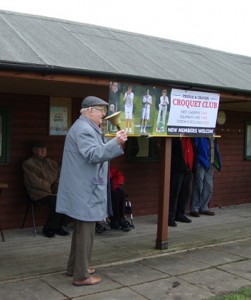
We have since been told that our score of 464 points scored in 24 hours may be a new world record, taking over from the previous record of 402 set on the 10th and 11th of June 2000 at Crake Valley….unless you know better!
As a club, we do not expect a queue for membership, but we do believe that this exercise will have put us front and centre in our community and may just have intrigued some sufficiently to drop in and try our wonderful game of croquet.
Roger Schofield & Garry Wilson
Further Report from Paul Rigge
Paul Rigge, as part of this year’s BBC Sports Relief fund raising activities was called into service to play Croquet for 24hours at Pendle Club, alongside Roger Schofield, Gary Wilson (who’s Bl***y Daft idea it was) & Liz Wilson.
Pendle *challenged* the Federation officers to play them and raise money so doing, and us all being young & fit didn’t think twice, after all how hard can it be? We used to all attend full weekend parties, didn’t we?
Play started in high spirits and fine dry weather at noon on the Friday and early progress was made despite loads of interaction from both teams (PR/GW vs. LW/RS). At dusk the *floodlights* (four 500watt halogen’s) were turned on so play could continue unbroken, and that’s when nature turned on to; with wind, rain, hail, clear moonlight skies, all being rotated in turn during darkness – it introduced another tactic into the game; ‘break down’ and send oppo out into the rain/hail/colder bits and regain the innings afterwards when that bit of weather had passed!
Food (it’s at Pendle remember), arrived, it seemed every two/three hours to keep our bodies fuelled for this marathon session, and fun and good conversation twix the *out players* kept sprits up through the long dark night – with the assistance of a donated bottle of Calvados when our ‘spirits’ needed topping up.
The current world record (according to the Guinness Book) for number of hoops run in a 24 game, is held by Crake in a match against Southport back in June 2000, the total was 402. By Noon on the Saturday, when the bell was rung (to our relief) to end the *timed game*, we’d managed 464!……but it will not count as the new *official* record, since nobody notified ‘The Book People’ before this event that we were making an attempt. However we did manage to raise more than £800 towards the charity total…smiles all round from us and the club got some great paper coverage.
Details of the sponsorship site, if you wish to contribute ( http://my.sportrelief.com/sponsor/24hourcroquet )
